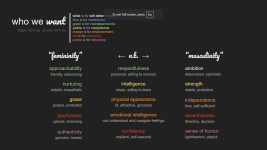AlinaX
Asymmetric Snowflake
- Joined
- Feb 1, 2014
- Posts
- 4,609
My problems are:
1. The ease with which so many people step from "On average, men are taller than women" to "Men are taller than women" to "Tall people must be men".
2. Selection bias: "To identify differences between men and women, we discarded subjects of ambiguous nature." Leading to: "We found clear differences between men and women." And to: "Yes there are outliers, but that doesn't change the findings. Look at all these other studies that did the same thing we did."
1. The ease with which so many people step from "On average, men are taller than women" to "Men are taller than women" to "Tall people must be men".
2. Selection bias: "To identify differences between men and women, we discarded subjects of ambiguous nature." Leading to: "We found clear differences between men and women." And to: "Yes there are outliers, but that doesn't change the findings. Look at all these other studies that did the same thing we did."
